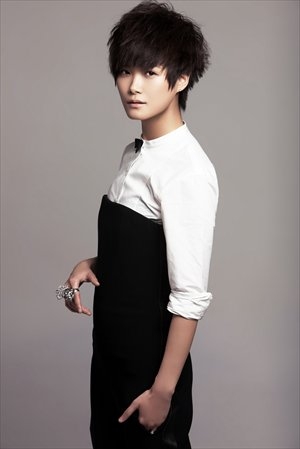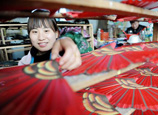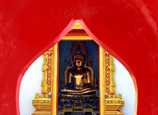
 |
| Li Yuchun(file photo) |
Yet, Li is representative in a sense because she is the first "elected" idol in China. Moreover, she never had any intention to become famous nor did gaining millions of fans change her personality.
Li told the Global Times that the only time she realized a possible change was during an interview in which she was asked if she likes to go to bed early and get up early. She doesn't, but she hesitated to admit it out of concern that her answer might influence kids.
"Still, I never felt like I'm a star and I don't actually like this word 'star.' The form of my work is easier for everyone to see. Besides that, I'm no different from others at all," said Li, adding that she loves to spend her spare time at home watching movies and listening to music, exactly the same as before.
In 2006, Li created her original concert brand "Why me?" for all the labels, all the love and all the hate thrown at her.
"Why me?" is more like an attitude, showing her strong personality - not too outrageous, just quietly cool.
The Li phenomenon
Individuality isn't a trait Chinese society has traditionally cherished. Celebrities' aesthetics were similar. For a good singer, you needed to have a powerful voice and high pitch. For a female celebrity, you needed to be good looking and feminine. The sound of Li's voice and tomboy style is just the opposite. She proved that you can be successful by being yourself and free from those restrictions and clichés.
The Queen and the Dreams, Youth of China, Old if not Wild and so on - the themes and images of Li's albums are all straightforward, nothing sophisticated but easy to connect with for the young generations in China.
Li and her team know very well what she can best represent and what the public likes. At a time when music is not only for your ears but also includes music videos, design and concerts, Li shows her creativity and personality at every turn.
If her win in 2005 was a result of the Chinese young people seeking individuality, her changes over the years and continued popularity can be seen as a reflection of the post-1980s and post-1990s generations trying to find a balance between maturing and being true to oneself. She has the "X factor" that China's pluralistic cultural age is looking for.
"Is the answer to 'why me' important to you?" I asked.
"No answer is important to me. That's probably the reason I want to keep trying all kinds of works," said Li.



















![]()
